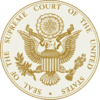Case law, also used interchangeably with common law, is a law that is based on precedents, that is the judicial decisions from previous cases, rather than law based on constitutions, statutes, or regulations. Case law uses the detailed facts of a legal case that have been resolved by courts or similar tribunals. These past decisions are called "case law", or precedent. Stare decisis—a Latin phrase meaning "let the decision stand"—is the principle by which judges are bound to such past decisions, drawing on established judicial authority to formulate their positions. (Full article...)

Lawrence v. Texas, 539 U.S. 558 (2003), is a landmark decision of the U.S. Supreme Court in which the Court ruled that U.S. state laws criminalizing sodomy between consenting adults are unconstitutional. The Court reaffirmed the concept of a "right to privacy" that earlier cases had found the U.S. Constitution provides, even though it is not explicitly enumerated. It based its ruling on the notions of personal autonomy to define one's own relationships and of American traditions of non-interference with any or all forms of private sexual activities between consenting adults.
In 1998, John Geddes Lawrence Jr., an older white man, was arrested along with Tyron Garner, a younger black man, at Lawrence's apartment in Harris County, Texas. Garner's former boyfriend had called the police, claiming that there was a man with a weapon in the apartment. Sheriff's deputies said they found the men engaging in sexual intercourse. Lawrence and Garner were charged with a misdemeanor under Texas' anti-sodomy law; both pleaded no contest and received a fine. Assisted by the American civil rights organization Lambda Legal, Lawrence and Garner appealed their sentences to the Texas Courts of Appeals, which ruled in 2000 that the sodomy law was unconstitutional. Texas appealed to have the court rehear the case en banc, and in 2001 it overturned its prior judgment and upheld the law. Lawrence appealed this decision to the Texas Court of Criminal Appeals, which denied his request for appeal. Lawrence then appealed to the U.S. Supreme Court, which agreed to hear his case.
The Supreme Court struck down the sodomy law in Texas in a 6–3 decision, and by extension invalidated sodomy laws in 13 other states, making all forms of private, consensual non-procreative sexual activities between two consenting individuals of either sex (especially of the same sex) legal in every U.S. state and territory. The Court, with a five-justice majority, overturned its previous ruling on the same issue in the 1986 case Bowers v. Hardwick, where it upheld a challenged Georgia statute and did not find a constitutional protection of sexual privacy. It explicitly overruled Bowers, holding that it had viewed the liberty interest too narrowly. The Court held that intimate consensual sexual conduct was part of the liberty protected by substantive due process under the Due Process Clause of the Fourteenth Amendment to the U.S. Constitution. Lawrence invalidated similar laws throughout the United States that criminalized sodomy between consenting adults acting in private, whatever the sex of the participants. (Full article...)







